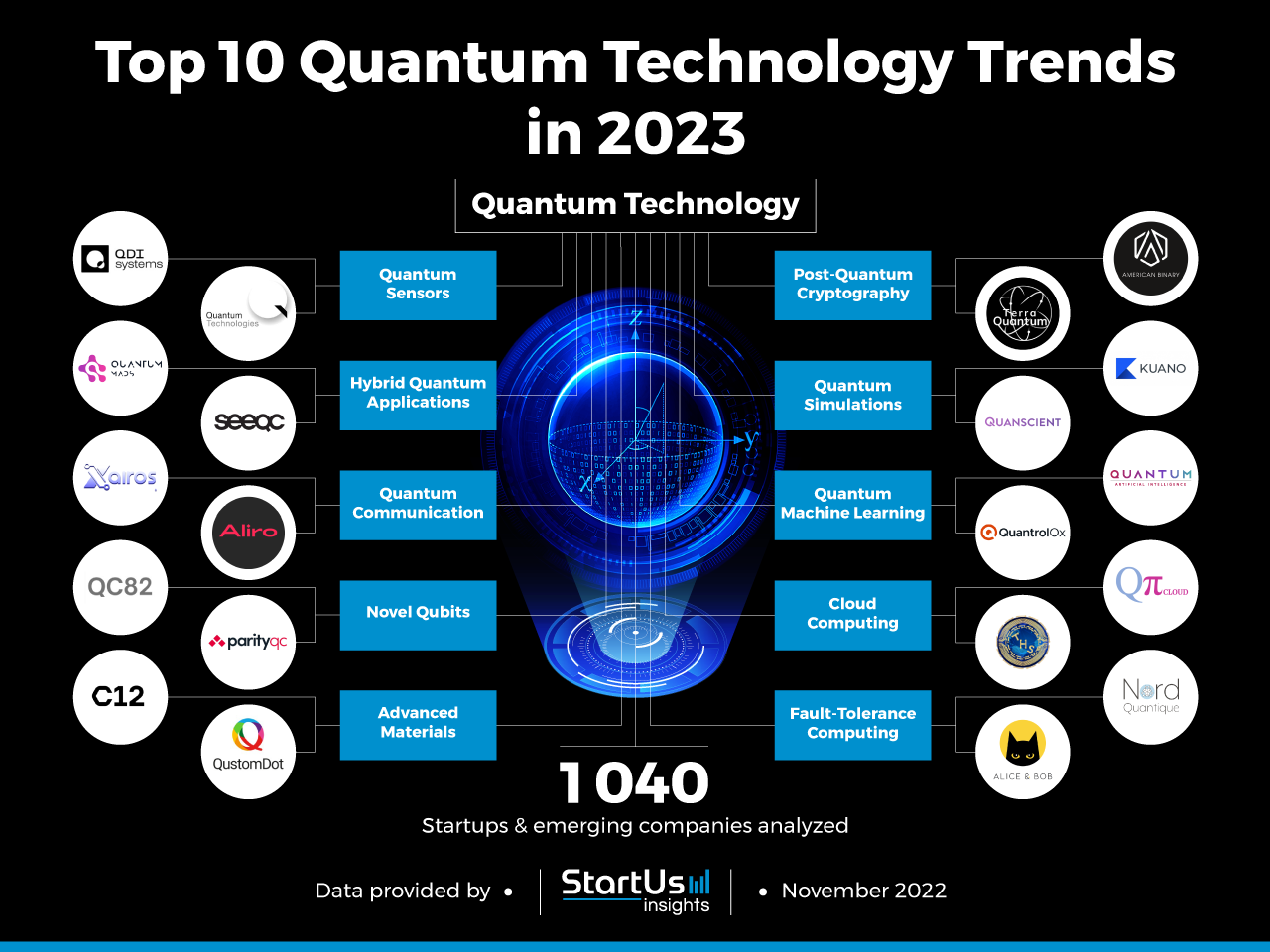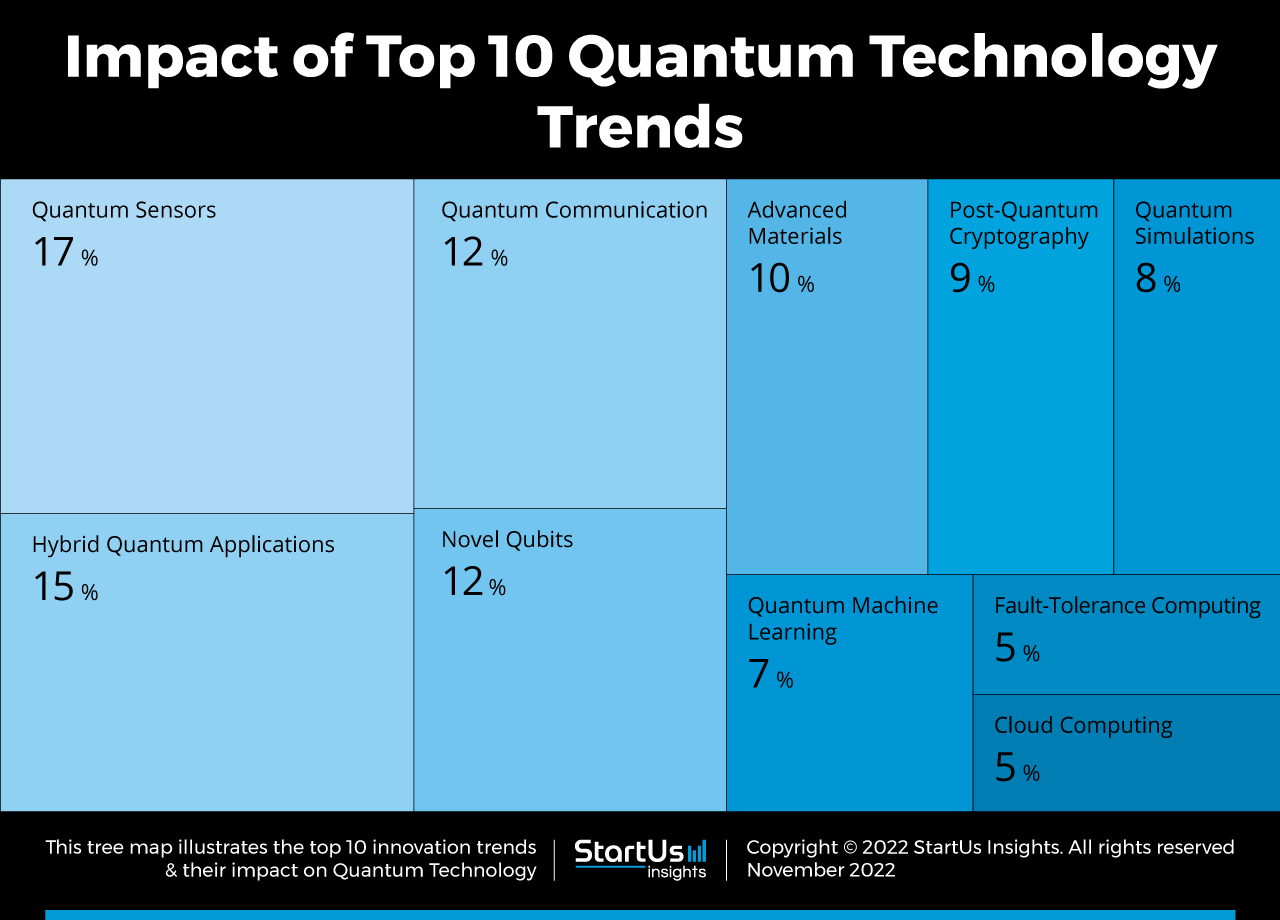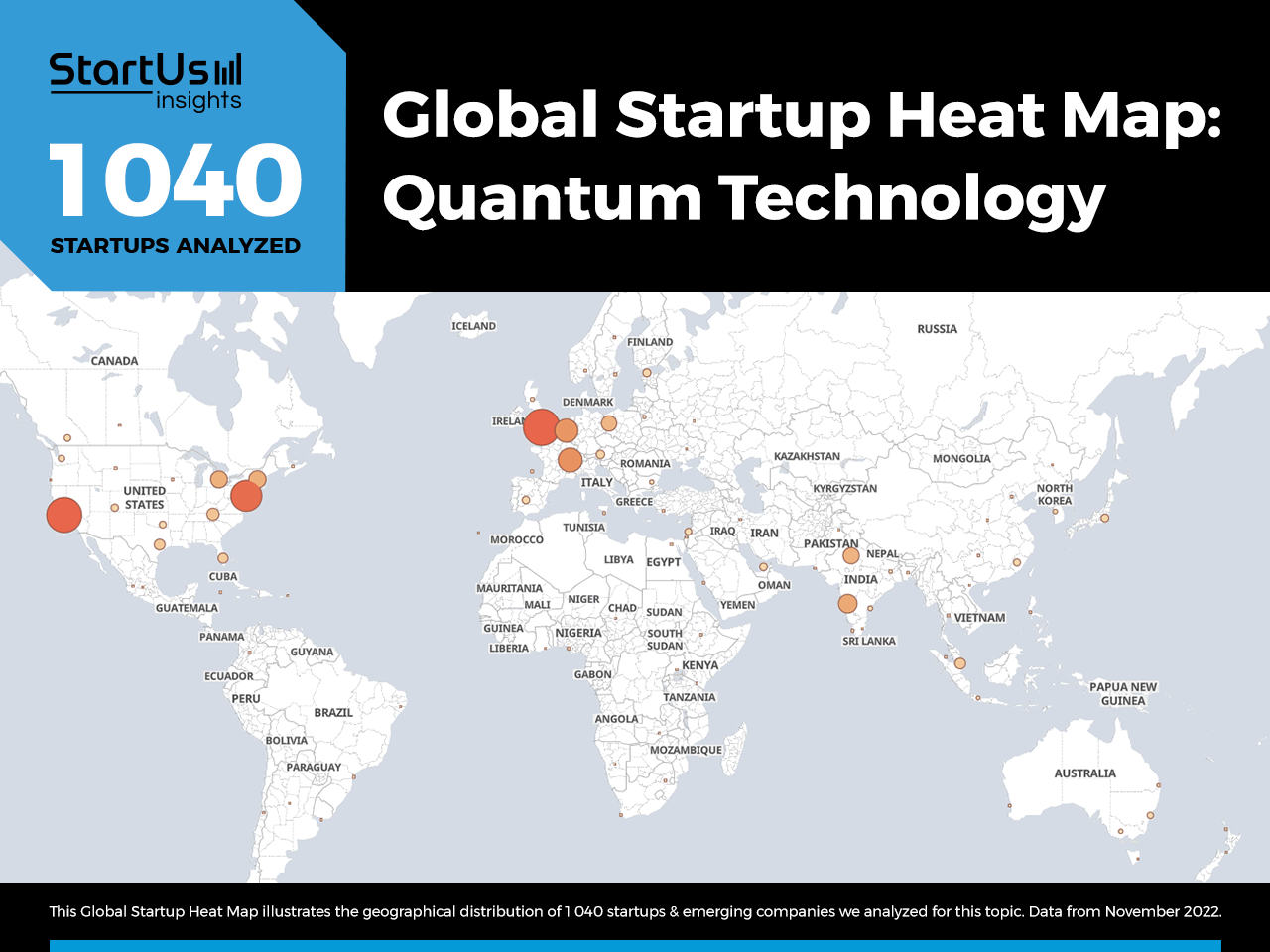As quantum mechanics paved its way from a theoretical frame to a practical one, more quantum-enabled technologies are finding applications to solve highly complex problems. Startups and scaleups are bringing quantum entanglement and superposition in various fields such as finance, healthcare, and space exploration. This article provides an overview of the top global quantum technology trends in 2023. They range from quantum sensing and communication to post-quantum cryptography and quantum cloud computing. Read more to explore the latest developments in quantum technologies that impact your business.
Innovation Map outlines the Top Quantum Technology Trends & 20 Promising Startups
For this in-depth research on the Top Quantum Technology Trends & Startups, we analyzed a sample of 20 global startups & scaleups. The result of this research is data-driven innovation intelligence that improves strategic decision-making by giving you an overview of emerging technologies & startups in the field of quantum. These insights are derived by working with our Big Data & AI-powered StartUs Insights Discovery Platform, covering 2 500 000+ startups & scaleups globally. As the world’s largest resource for data on emerging companies, the SaaS platform enables you to identify relevant startups, emerging technologies & future industry trends quickly & exhaustively.
In the Innovation Map below, you get an overview of the Top 10 Quantum Technology Trends & Innovations that impact companies worldwide. Moreover, the Quantum Technology Innovation Map reveals 20 hand-picked startups, all working on emerging technologies that advance their field.
Top 10 Quantum Technology Trends
Tree Map reveals the Impact of the Top Quantum Technology Trends
Based on the Quantum Technology Innovation Map, the TreeMap below illustrates the impact of the Top 10 Quantum Technology Trends in 2023. Startups and scaleups are developing quantum sensors for high-precision measurements on a micro level. They are also leveraging hybrid quantum applications to benefit from powerful algorithms for existing computers. Further, the superposition state of qubits enables fast and secure data transmission, powering quantum communication. Meanwhile, novel qubits and advanced materials deliver improved chip architectures and platforms for stable and decoherence-free operation. This is critical for the adoption of quantum technologies. Post-quantum cryptography offers higher protection against quantum threats. Quantum machine learning (ML) and simulations are also major trends, which accelerate computations for new research discoveries. Lastly, cloud computing makes quantum technologies accessible, while fault-tolerant strategies enable the practicality and scalability of quantum computers.
Global Startup Heat Map covers Quantum Technology Startups & Scaleups
The Global Startup Heat Map below highlights the global distribution of the 1 040 exemplary startups & scaleups that we analyzed for this research. Created through the StartUs Insights Discovery Platform, the Heat Map reveals high startup activity in the USA and Europe.
Below, you get to meet 20 out of these 1 040 promising startups & scaleups as well as the solutions they develop. These quantum technology startups are hand-picked based on criteria such as founding year, location, funding raised, & more. Depending on your specific needs, your top picks might look entirely different.
Top 10 Quantum Technology Innovation Trends for 2023
1. Quantum Sensors
Classical sensors are unable to detect quantum activities in the physical world. That is why quantum sensors play an important role in measuring quantum properties through quantum entanglement, quantum interference, and quantum state squeezing. Such sensors utilize photonic, atomic, and solid-state systems to detect small-scale changes in time, gravity, temperature, pressure, magnetic fields, etc. By harnessing data at the atomic level, quantum sensors provide optimized precision and reliability that overcomes the limitations of current sensor technologies. This benefits safety-critical fields including weather forecasting, healthcare, seismology, and others.
Quantum Technologies develops Microwave-Free Magnetic Field Sensors
German startup Quantum Technologies makes microwave-free quantum-based magnetic field sensors. Current measuring methods require large setups with high power consumption, causing self-heating or performance degradation due to eddy currents. To resolve that, the startup’s sensors feature a microwave-free design leading to high sensitivity and wide detection range. The sensors use the spin states and fluorescence intensity to measure the magnetic flux density through scalar magnetometry. As a result, the sensors feature a smaller form factor and are cost-effective while offering enhanced precision valuable for security and military applications.
QDI Systems delivers X-Ray Quantum Detectors
Dutch startup QDI Systems provides X-ray detectors based on quantum dot (QD) technology. The X-ray sensors apply solution-processable semiconductor nanoparticles that provide high-contrast mammograms for medical imaging. The material features qualities such as high X-ray absorption, a powerful signal at low dose rates, and high resolution. This is why the startup’s imaging devices offer robust performance and accurate medical information for radiologists.
2. Hybrid Quantum Applications
As long as pure quantum applications are not mature enough for the market, hybrid quantum computing is one of the most promising approaches for industrial applications. The combination of quantum elements and classic computers takes advantage of both to solve highly complex problems. Hybrid systems adopt quantum power for various applications, including investment projection, route optimization, city planning, energy distribution, and more. While waiting for the full-scale deployment of quantum computing, hybridization provides early access to quantum computing for business problems.
Quantum Mads offers Hybrid Quantum Software As A Service (QSaaS)
Spanish startup Quantum Mads builds a hybrid QSaaS tool to tackle complex industrial challenges. The startup’s portfolio includes the Q-Allocate and Q-Crypto products that apply annealing computation, quantum techniques, digital-analog computation, and gate-based quantum computers. By doing this, the startup optimizes the investment plans under different metrics and finds the shortest paths of a specific graph, leading to reduced execution time. The integration of quantum nodes enables classical infrastructures to obtain valuable insights into the finance, logistics, ecology, healthcare, and manufacturing industries.
SEEQC produces Quantum System-on-a-Chip
US-based startup SEEQC makes a digital quantum management (DQM) system-on-a-chip that binds quantum hardware with quantum algorithms and applications. The DQM system integrates critical quantum management functions, digital logic, and classical computing power in a single processor, SFQuClass. It is a single flux quantum processor that performs digital qubit control, readout, and data processing as a platform for error correction. This way, the DQM-on-a-chip scales quantum technologies across multiple hardware designs, reduce complexity, and maximizes cost-effectiveness.
3. Quantum Communication
Current digital data transmission protocols use classical (1 or 0) bits, which lack data integrity. However, quantum communication applies the principles of superposition to transmit the mixture of both 1 and 0. It transfers encoded information through optical fiber networks and satellites. Further, quantum encryption secures random keys in a way that hackers cannot break through without leaving signs of activity. This enables secure data exchange and distributed quantum computing, which is a foundation for the quantum internet. Besides, the entanglement phenomenon creates pairs of inextricably linked qubits that transmit data independent of the distance through quantum teleportation. As a result, quantum protocols allow fast secure data exchange applied in clocking systems, seismic monitoring, weather networks, space exploration, and others.
Xairos provides Quantum Clock Synchronization
US-based startup Xairos offers quantum clock synchronization to achieve secure communication and accurate timing through entangled photons. Time synchronization is critical for position, navigation, timing, and network applications. Therefore, Xairos removes the risk of communication outages by using the quantum qualities of photon particles. This way, the startup allows networks to increase bandwidth and reduce latency for precise time distribution systems.
Aliro advances Quantum Internet
US-based startup Aliro enables quantum internet through entanglement-based quantum network solutions. Its technology, AliroNet, implements universal entanglement-based networks through 3 district modes – emulation, small-scale piloting, and full-scale deployment. Within emulation mode, the startup’s software accelerates the design and running of network protocols with high-resolution time. Then, during the small-scale pilot mode the software tests and optimizes the network performance. For the deployment mode, the system connects multiple geographically dispersed quantum sensors and centralized processing, storage, and analytical systems. This way, Aliro builds a foundation for scalable and powerful quantum internet with secure communication.
4. Novel Qubits
Similar to bits in classical computing, qubits are the smallest data storage units in quantum systems. However, qubits exist in a superposition state of 0 and 1 simultaneously. This ability to store multiple states at once makes quantum computers highly powerful. Qubits require extremely low-temperature conditions, constant cooling, and enhanced isolation from noises. Therefore, startups are designing advanced qubit architectures and control methods to mitigate the practical applications of qubits. Novelties in qubit design, such as plasonium, high-fidelity quantum gates, and room-temperature controllers, allow noise-resilient and decoherence-free functioning. This way, technological innovations open new ways to scale up multi-qubit devices.
QC82 produces Room-temperature Photonic Detectors
US-based startup QC82 manufactures room-temperature photonic chips for scalable quantum computing. Since existing quantum phenomena function only at ultra-low temperatures, the startup’s room-temperature photodetection overcomes this challenge. The startup uses scalable on-chip quantum photonics to achieve this. It also features a number-resolving detector for fault-tolerant and error-correcting practical applications. Consequently, QC82 delivers more processing power with less hardware development costs and time. This pushes forward companies working in quantum computing, quantum communications, and quantum sensing.
ParityQC simplifies Qubit Architecture
Austrian startup ParityQC designs qubits with simplified architecture to encode optimization problems on quantum computers. Existing practices translate optimization problems to algorithms, whereby gates between qubits require programming. In comparison to that, ParityQC’s architecture encodes the problem in the local fields of individual qubits and separates it from gate interactions. This shifts the optimization from hardware to software, thus allowing for the computation of multiple problems on the same chip. By doing this, the startup’s parallelizable gates enable time reduction, high cross-platform scalability, and controlled cross-talk error mitigation.
5. Advanced Materials
Although the number of quantum algorithms is significantly growing, material innovations are critical to enabling their practical applications. With advanced materials, quantum technologies offer functionalities such as topological conduction, superconductivity, and manipulation of quantum information. Promising host materials for quantum systems include silicon, diamond, rare-earth-doped crystals, nanomaterials, and 2D materials, among others. They represent material candidates to create novel qubits and emitters with tangible implementation. These advances in materials allow the miniaturization and scalability of quantum technologies while delivering energy-efficient electronic devices.
C12 grows Ultrapure Carbon Nanotubes
French startup C12 offers atom-by-atom ultrapure carbon nanotubes via chemical deposition. Its nanotubes contain the 12C isotope of carbon that suppresses unwanted noise from the nuclear-electron spin coupling. After growth, the startup uses a non-invasive method to select candidates with desired semiconducting gaps and minimal defects to build qubits. This creates a distinguished host material for a spin qubit with decreased intrinsic decoherence. Moreover, C12 integrates nanotubes onto silicon chips free from potential contamination using its patented nano assembly technology. This eliminates noise sources within quantum machinery, thus obtaining high fidelity and strong qubit connectivity to benefit energy, utilities, logistics, and transportation fields.
QustomDot develops Quantum Dot-powered Led Chips
Belgian startup QustomDot provides semiconductor nanoparticles for LED chips by applying quantum dot (QD) technology. By controlling the size of particles, the startup’s technology transforms UV or blue light into other pure colors. However, obstacles such as degradation at high temperatures and light flux limit the application of QD technology. Therefore, the startup utilizes an on-chip grade approach and applies QD technology directly to LED chips. In doing so the startup improves the brightness, lifetime, and efficiency of devices cost-effectively for the next-generation LED displays, TVs, and augmented reality goggles.

6. Post-Quantum Cryptography
With the rapid development of quantum technologies, new standards of post-quantum cryptography for classical computers are gaining traction. Post-quantum encryption solutions detect threatening interferences in data transmission by applying entangled atoms. They leverage quantum-resistant mathematical schemes based on the quantum key distribution (QKD), multivariate, lattice-based, and hash-based cryptosystems. This way, quantum cryptography ensures secure key exchange for communication, identifies eavesdropping and offers guaranteed key encryption life to withstand malicious attacks.
American Binary utilizes Lattice-based Cryptography Constructions
US-based startup American Binary provides post-quantum encryption based on quantum-safe networking technology. It uses lattice-based cryptography constructions following the NIST standardization, which ensures quantum-resistant algorithms. This is a foundation for Post-Quantum Encryption-as-a-Service (QEaaS) solutions, including post-quantum VPNs and internet protocols. The network layer implementation secures the infrastructure, networks, and communication without the loss of throughput and latency.
Terra Quantum introduces Long-distance Quantum Key Distribution (QKD)
Swiss startup Terra Quantum combines true randomness and quantum cryptography to secure communication. The startup introduces advanced quantum key distribution to share secret keys at high speeds and over long distances. The QKD protocols implement the principles of physical loss control, ciphering schemes, global distance, and trusted nodes-free unconditional security. Additionally, its quantum random number generator (QRNG) devices utilize fiber, lasers, and diodes for better accuracy without post-processing. This way, Terra Quantum increases usability in a wide range of applications such as blockchain and cloud-based security systems.
7. Quantum Simulations
Quantum simulations play an important role in the discovery of new materials and further understanding of underlying laws of reality that are beyond-classical mathematical models. Therefore, research in quantum effects opens new possibilities for industries to develop cost-efficient and practical quantum solutions. Startups run quantum simulations to measure quantum phenomena, mechanisms, and processes within individual particles. Moreover, they reveal unseen properties in terms of position, velocity, chemical reaction, energy, etc. Such valuable insights contribute to the progress of material modeling, drug development, climate change modeling, and others. For example, organizations optimize power grids by predicting environmental changes using quantum models. As a result, quantum simulations deliver a time-efficient way to perform targeted experimentations for broader exploration.
Quanscient provides a Quantum Simulation-as-a-Service Platform
Finnish startup Quanscient develops a quantum simulation-as-a-service platform for fast, efficient, and sustainable engineering. It employs quantum computing, parallel cloud scaling, and computational “multiphysics” to simulate a wide range of models including electric motors, superconductive materials, aerodynamics, or structural integrity. This moves physics simulation away from hardware, allowing it to combine complex calculations on a single platform flexibly and collaboratively.
Kuano advances Quantum-based Drug Discovery
UK-based startup Kuano combines quantum simulations and AI-driven algorithms for drug discovery. While enzyme reactions are under the rule of quantum mechanical laws, classical drug design ignores the tight binding states during these reactions. The startup develops a software platform, Quantum Lens, to detect the transition states and further use them for effective, low-toxicity drug discovery. It reveals differences between enzymes for accurate targeting without a negative impact on healthy proteins. This allows researchers to leverage detailed enzyme profiles and uncover hidden potential drug candidates.
8. Quantum Machine Learning
Startups and scaleups extensively incorporate machine learning with quantum mechanics to expand computational capacities. By executing machine learning algorithms on quantum computers users explore problems that are exponential in nature and too complex for typical processors. This way, quantum technologies improve the speed of machine learning for applications that require optimization encoding. Additionally, quantum machine learning allows faster model training through quantum parallelism by performing superposition simultaneously. At the same time, ML and AI-driven technologies provide automatic control of quantum devices for identifying the sources of noise and performance degradation. This way, quantum and machine learning technologies mutually benefit each other to bring the quantum future closer.
Quantum Artificial Intelligence makes Quantum-powered AI
UK-based startup Quantum Artificial Intelligence creates a secure AI platform based on quantum computing. With a quantum computing engine, the startup improves AI and machine learning performance in terms of accuracy and training time. Quantum concepts in mathematical calculations enable AI to process larger sets of data and deliver deeper insights. The platform solves complex problems and delivers accurate insights in various industries ranging from healthcare and education to manufacturing and transportation. As a result, Quantum Artificial Intelligence’s platform allows businesses and researchers to quickly develop data processing products capable of self-learning for better decision-making.
QuantrolOx offers ML-based Quantum Control Software
Finnish startup QuantrolOx builds ML-based control software for quantum technologies to tune, stabilize, and optimize qubits. Due to the intricate nature of fabrication, intelligent automation of control systems is crucial to enable practical quantum computers. QuantrolOx’s software leverages machine learning to characterize and control cubits by automatically tuning devices to optimal performance. Moreover, the startup applies automated ML-enabled control to all types of quantum technologies. The software benefits companies that focus on superconducting and semiconductor-based spin qubits.
9. Cloud Computing
The high performance of quantum computing is appealing to multiple spheres. However, the high costs of operating quantum computers hinder shared access. That is why cloud computing is necessary to provide global access through remote data processing. Cloud computing connects powerful quantum computer systems without the need to invest in expensive hardware infrastructure. Moreover, quantum cloud computing mitigates in-house product development. This makes quantum processing available “as a service” running on its servers and data centers, thus accelerating its adoption. Finally, quantum physics enables secure cloud-distributed computing merging potential into a qubit-transporting internet.
QpiCloud develops a Quantum Cloud Platform
Indian startup QpiCloud creates a quantum cloud platform powered by AI and quantum computing. The platform automatically connects workflows across enterprises using AI and converts typical workflows into secure hybrid quantum-based workflows. Further, cloud computing strengthens collaborative partnerships through universal access to quantum power, leading to efficient project management. This improves data virtualization and exchange across enterprises, accelerating the response rates to critical issues.
The Hash Speed (THS) assembles a Quantum Cloud Mining Platform
UK-based startup THS builds a decentralized quantum cloud mining platform. One of the major challenges of cloud crypto mining is high energy costs and irregularity in mining rewards. To resolve that, the startup’s quantum-based solution improves the hash rate on blockchain networks to increase mining income. THS thus makes cloud mining infrastructure less resource-demanding and more rewarding for miners, investors, traders, networkers, etc.
10. Fault Tolerance Computing
One of the foremost challenges for quantum computing hardware is to build a sizable, fault-tolerant processor. This is due to the high sensitivity of subatomic particles to heat and energy changes like machine environment, cosmic rays, electromagnetic radiation, etc. Therefore, startups are developing more efficient coding techniques and qubit grouping for lower error rates. The leading software and hardware technologies also introduce quantum error correction (QEC) and new bosonic codes to protect computers against outside disruption.
Nord Quantique produces Error-correcting Bosonic Systems
Canadian startup Nord Quantique develops error-correcting quantum processors. Since most of the processors suffer from the noise on the chips, the startup redesigns processors with low-error qubits. Its superconducting circuits with bosonic codes mitigate errors while isolating the system from the environment. This way, hardware-based bosonic systems open new ways for fault tolerance to encode, protect, process, and retrieve quantum information. This brings advantages for companies developing quantum memories, communication, and scalable computation.
Alice&Bob advances Self-correcting Cat Qubits
French startup Alice&Bob offers self-correcting quantum computing. Due to decoherence, the construction of physical quantum computers requires their isolation from the classical universe to overcome errors. To tackle this, the startup utilizes superconducting circuits that remain coherent and controllable for long periods by fabricating cat qubits. Cat qubits resolve the bit-flip errors through a multi-photon dissipation process. This architecture requires less hardware for error correction by leveraging the Hilbert space of a harmonic oscillator. Consequently, this results in a self-correcting chip design that combines speed and resilience for improved quantum computers useful for logistics, supply chain management, and drug discovery.
Discover all Quantum Technology Trends, Technologies & Startups
Quantum technologies analyze quantum effects at the atomic level to forecast potential damages in precise, efficient, and cost-effective ways. For instance, quantum computing optimizes power generation via simulations to resolve the climate crisis. Further, post-quantum security and quantum internet will impact the performance of communication systems.
The Quantum Technology Trends & Startups outlined in this report only scratch the surface of trends that we identified during our data-driven innovation & startup scouting process. Among others, advances in computing, materials, & hardware development will transform the sector as we know it today. Identifying new opportunities & emerging technologies to implement into your business goes a long way in gaining a competitive advantage. Get in touch to easily & exhaustively scout startups, technologies & trends that matter to you!











